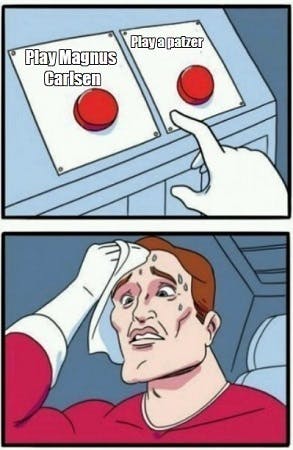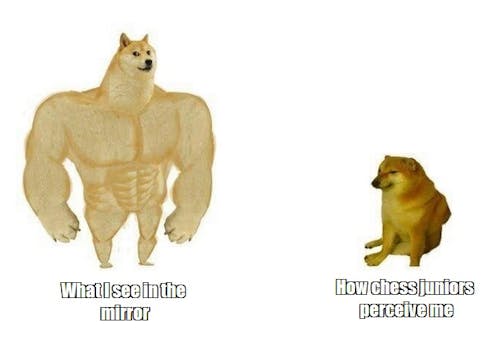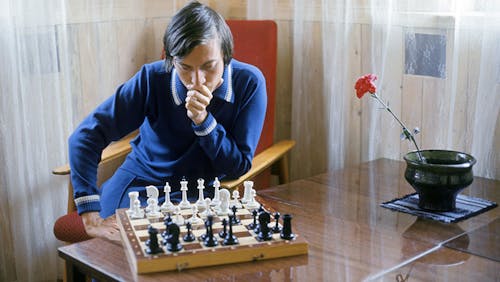Are you sure you want to delete your account?
(This will permanently delete all of your data - purchases, game scores, ratings, etc)
Change your username
Your current username is: guest
Change your account email address
Your current account email is:
Redeem your Fampay code here!
Use your Fampay code to get access to the Play Magnus Plus Membership!

How to Choose Your Opponent in Chess
The only way to become smarter is to play a smarter opponent.
Emanuel Lasker
If you wish to improve efficiently, it’s better to play relatively strong open events with mixed opposition or round robins where the average level is slightly above your own. Why is that the case?
There is a peculiar category of players who hate losing, so they beat their lower-class opponents repeatedly and become “local champions” of their club/city/country. When you face less experienced and weaker opponents, it is tough to learn something new from them. The law of communicating vessels seems to work in chess: if you put a strong and a weak player in a room and force them to play each other over and over again for years, the better one will regress chess-wise, while the weaker one would usually improve. Prisons are an excellent illustration of this phenomenon.
“Local champs” tend to get stuck at a certain level. This statement is also true of many female players: they get accustomed to playing each other and earning prizes at the 2400-2600 level. As a result, they fail to progress beyond that threshold because they rarely face more demanding challenges. The same can be said about park hustlers: their opposition is usually inferior to them in terms of playing skills, so the blitz masters stagnate even though they keep playing chess day after day.
One of my friends was fond of playing blitz matches online. He would often pick a victim and crush him something like 9-1 or even 10-0 (they call it “adoption” these days), feeling very happy about himself. Then I would approach him, and our conversation would proceed along these lines:
I: So, you found another patzer and whitewashed him, right?
He: Sure! (smiles)
I: And what have you achieved by doing this?
He: Well, I gained some rating points…And it felt good to win! (sounds unconfident)
I: But do these online rating points give you any tangible benefits?
He: Not really…
I: Have you learned anything new?
He: Guess not. He is just a weak guy, so what can playing against him teach me?
I: Do you agree that it’s just a temporary boost for your self-esteem, but it is hardly beneficial for your chess in the long run?
He: Well, I know, but what can I do? The site paired him against me, then he sent me a rematch, and I accepted.
It was quite hard for my friend to get rid of this habit, and from time to time, a relapse occurs. Still, nowadays, he is more aware of whom he is playing and for what purpose.
As you may have already noticed, this post is written from the perspective of someone who wants to improve in chess but doesn’t necessarily have to make a living by playing. As a chess professional, you must reach a balance between earning enough money to make a living and remembering to invest in your future so that you can unlock your chess potential.
Missing worthy opponents? Want to take on world-class Grandmasters, such as World Chess Champion Magnus Carlsen or the strongest female chess player ever Judit Polgar? Regardless of your current chess expertise, you will find an exciting challenge for yourself in our popular Play Magnus app!
There is a good quote by Michael Dell: “If you’re the smartest person in the room, you are in the wrong room.” Remember to reach for more once you are done with your previous goals.
However, it is essential not to become overconfident. Another typical mistake is overestimating oneself and taking only on players who are way more proficient. Such behavior results in a string of painful defeats, losing self-confidence, and a decline of interest in the game. If you are not strong enough psychologically, you may end up devastated to the extent of quitting.
Now that I have preyed on my unsuspecting friend, let me do some self-bashing. Back in 2010, I worked hard on chess and earned 29 rating points in a single event. This lured me into a trap of believing that I was fully capable of playing in a strong IM-norm tournament in Moscow. Apart from picking on a field that was rated about 200 points above myself, I performed all sorts of other mistakes there:
• Spent a lot of time traveling to the tournament hall for each of the rounds, tiring myself before the games even began.
• Played in a heated venue in summer (I can’t stand the sun; my brain starts to melt after some time if the temperature around is too high).
• Didn’t eat well before the game and forgot to bring snacks with me (very important!).
• Couldn’t switch to damage control mode and still went berserk on everyone. For example, in the last round, one IM from the US offered me a draw, but I declined it and lost.
• Made many chess-specific errors that are beyond the scope of this article.
Prior to this tournament, I had won some events in my life with a 100% score. Here the situation was reversed: I lost all 11 (!) games, learning a lot about how not to approach chess events. The findings were well worth the time invested and the 39 rating points that I shed there.
Optimally, you win some, you lose some, but you learn important things and improve along the way. One famous chess coach recommended to me the following ratio: roughly 50% of games played against more or less equal opponents, 25% games against weaker players, and 25% against stronger adversaries. I am not sure that there is any scientific research behind the numbers, so let these figures serve as food for thought for you rather than a dogma.
P.S. Since this blog post is being written in the times of the raging COVID pandemic, it makes perfect sense to say a few words about online chess. My recommendation here will be the same: if possible, set up a filter so that you get paired against opponents of more or less equal or higher skill. Unfortunately, as you climb the rankings, it gets increasingly harder to find a decent opponent, so you should be patient enough to wait for a good match and be prepared to face cheaters now and then. But this is a different story!

